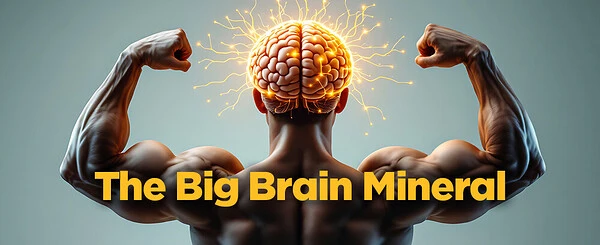The Big Brain Mineral
Introduction
If one aims for a more robust, agile, and astute brain, it is essential to consume more of a particular mineral than what the Recommended Dietary Allowance (RDA) suggests.
When it comes to the brain, size matters. A well - conditioned brain has enhanced problem - solving capabilities, faster processing speeds, superior planning abilities, a greater capacity to acquire new skills rapidly, and better memory retention. Moreover, a larger brain is also a stronger and more youthful one. It exhibits increased resilience against cognitive decline and diseases, copes better with stress, and ages at a slower pace.
The Role of Magnesium in Brain Health
Magnesium has long been recognized as having a significant role in maintaining brain health. However, a recent study indicates that the daily amount of magnesium we consume has been falling short of what is actually required.
The Study
Researchers were keen to investigate the relationship between magnesium intake and enhanced brain health. Specifically, they focused on two aspects: larger brain volumes (which signify more brain tissue) and fewer white matter lesions (small areas of damage associated with cognitive decline, stroke risk, and depression).
The study involved 6000 individuals over the age of 40. Diet questionnaires and MRI brain scans were utilized. The findings were as follows:
There was a positive correlation between higher magnesium intake and overall larger brain volumes, including greater gray matter and hippocampal volume.
Higher magnesium intake was also associated with a reduced number of white matter lesions.
Magnesium Requirements
The RDA for magnesium is approximately 350 mg per day, with men requiring around 50 mg more and women slightly less. Nevertheless, in this study, those with the largest and healthiest brains were consuming more magnesium, with some approaching 550 mg per day. These individuals had less brain shrinkage and fewer damaged areas. This clearly demonstrates that for optimal brain health, the RDA may not be sufficient.
Magnesium - Rich Foods and Supplementation
Foods such as pumpkin seeds, almonds, spinach, dark chocolate, and black beans are excellent sources of magnesium. However, it can be challenging to consume 500+ mg of magnesium daily from diet alone to achieve the benefits for brain size. Therefore, supplementation is a prudent choice.
Chelated magnesium, especially those using the Albion - chelated method, is the most readily absorbed. Biotest Elitepro Vital Minerals (available for purchase on Amazon) contains 400 mg of Albion - chelated magnesium.
In addition to magnesium, Elitepro also includes 30 mg of zinc, 200 mcg of selenium, 200 mg of chromium, and 100 mcg of vanadium, fulfilling all your mineral requirements for optimal health.
Reference
- Alateeq, Khawlah, et al. “Dietary Magnesium Intake Is Related to Larger Brain Volumes and Lower White Matter Lesions with Notable Sex Differences.” European Journal of Nutrition, vol. 62, no. 5, Aug. 2023, pp. 2039 - 51
Jack Up This Mineral for a Stronger Brain
•
Author: Hamid
•
fitness
sport
life

Share this article
